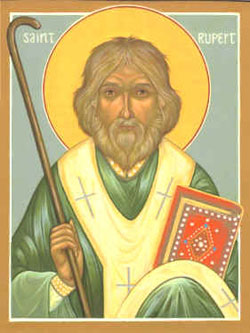
Feastday: March 27
Birth: 60
Death: 717
Bishop and missionary, also listed as Robert of Hrodbert. A member of a noble Frankish family, he was appointed bishop of Worms, Germany, and then dedicated himself to spreading the faith among the Germans. With the patronage of Duke Thedo of Bavaria, he took over the deserted town of luvavum about 697, which was renamed Salzburg, Austria. Rupert founded a church, a monastery, and a school; brought in groups of missionaries; and established a nunnery at Nonnberg with his sister, Eerentrudis, serving as the first abbess. He died at Salzburg and is venerated as the first archbishop of this major diocese in the West. Rupert is revered as the Apostle of Bavaria and Austria.
Rupert of Salzburg (German: Ruprecht, Latin: Robertus, Rupertus; c. 660 – 710 AD) was Bishop of Worms as well as the first Bishop of Salzburg and abbot of St. Peter's in Salzburg. He was a contemporary of the Frankish king Childebert III. Rupert is venerated as a saint in the Roman Catholic and Orthodox Churches. Rupert is also patron saint of the Austrian state of Salzburg.
Life
Holy tradition states that Rupert was a scion of the Frankish royal Merovingian dynasty; he was possibly related to the Robertians, and likely a descendant of Count palatine Chrodbert II.
 Baptism of Duke Theodo by Bishop Rupert, Franciscus de Neve (II) (c. 1670).
Baptism of Duke Theodo by Bishop Rupert, Franciscus de Neve (II) (c. 1670).
As bishop at Worms, Rupert was first accepted as a wise and devout dignitary, but the mostly pagan community came to reject him and forced him out of the city by the end of the 7th century. The Agilolfing duke Theodo of Bavaria requested that he come to his residence at Regensburg (Ratisbon) to help spread the Christian faith among the Bavarian tribes.
Rupert then moved to Altötting, where he started his missionary work by preaching to the locals. He would sail down the Danube river, visiting many towns, villages and forts. Soon he had converted a large population along the Danube, reaching southeastward to the Bavarian border with the Pannonian lands, which were under the rule of the Avar Khaganate. Here, he stayed at Lorch, the former Roman city of Lauriacum (today part of Enns), where an early Christian church—the present Basilica of St. Lawrence—already existed.
Warlike conditions in the borderlands made him abandon plans of missionary work in the territories of the Pannonian Avars. Instead, he proceeded along the Roman road via Seekirchen to the ruined city of Juvavum, which he made his base and renamed "Salzburg" (Latin: Salisburgum). As in Lorch, Rupert was able to build on early Christian traditions that were already in place. He re-established the monastic community at St. Peter's Abbey and laid the foundations of Salzburg Cathedral, which was finished by his successor Vergilius. He also founded the Benedictine nunnery of Nonnberg beneath the Festungsberg fortifications (later Hohensalzburg Fortress), where his niece Erentrude became the first abbess.
Rupert also introduced higher education and other reforms. From Duke Theodo of Bavaria his bishopric received estates around Piding and Reichenhall, where he promoted the development of the local saltworks. Rupert's mission work also spread into the Alps, where the first monastic cell (Cella Maximiliana) was founded at present-day Bischofshofen about 711.
Rupert reportedly died on Easter Sunday around 710. According to other sources, he returned to his hometown of Worms, where he died in 717. His mortal remains were transferred to Salzburg Cathedral by Bishop Vergilius on 24 September 774.
Veneration
Rupert's life and mission work is documented in medieval chronicles such as the Conversio Bagoariorum et Carantanorum. In accordance with Christian tradition, St. Rupert's feast day is celebrated by the Eastern Orthodox Church on the anniversary of his death, March 27 (March 28 according to the Lutheran Calendar of Saints). In Austria, it is September 24, commemorating the translation of his relics to Salzburg Cathedral. Rupertitag or Rupertikirtag is also a public holiday in the state of Salzburg, associated with popular Volksfest events.
Rupert is the patron saint of the state of Salzburg, the Roman Catholic Archdiocese of Salzburg (together with his successor Vergilius), and of the adjacent Bavarian Rupertiwinkel region. He is also known as the "Apostle of the Bavarians" and is patron of several settlements, such as Sankt Ruprecht in Styria and Šentrupert in Slovenia, and of numerous church buildings.
Gallery
-

An Austrian stamp of 1948 depicting a statue of Saint Rupert
-

Etching of Saint Rupert by Bock after Johann Wolfgang Baumgartner
-

Head of a Gothic style statue of Saint Rupert
-

Saint Rupert, as a founder of a church ("fundator ecclesiae")









